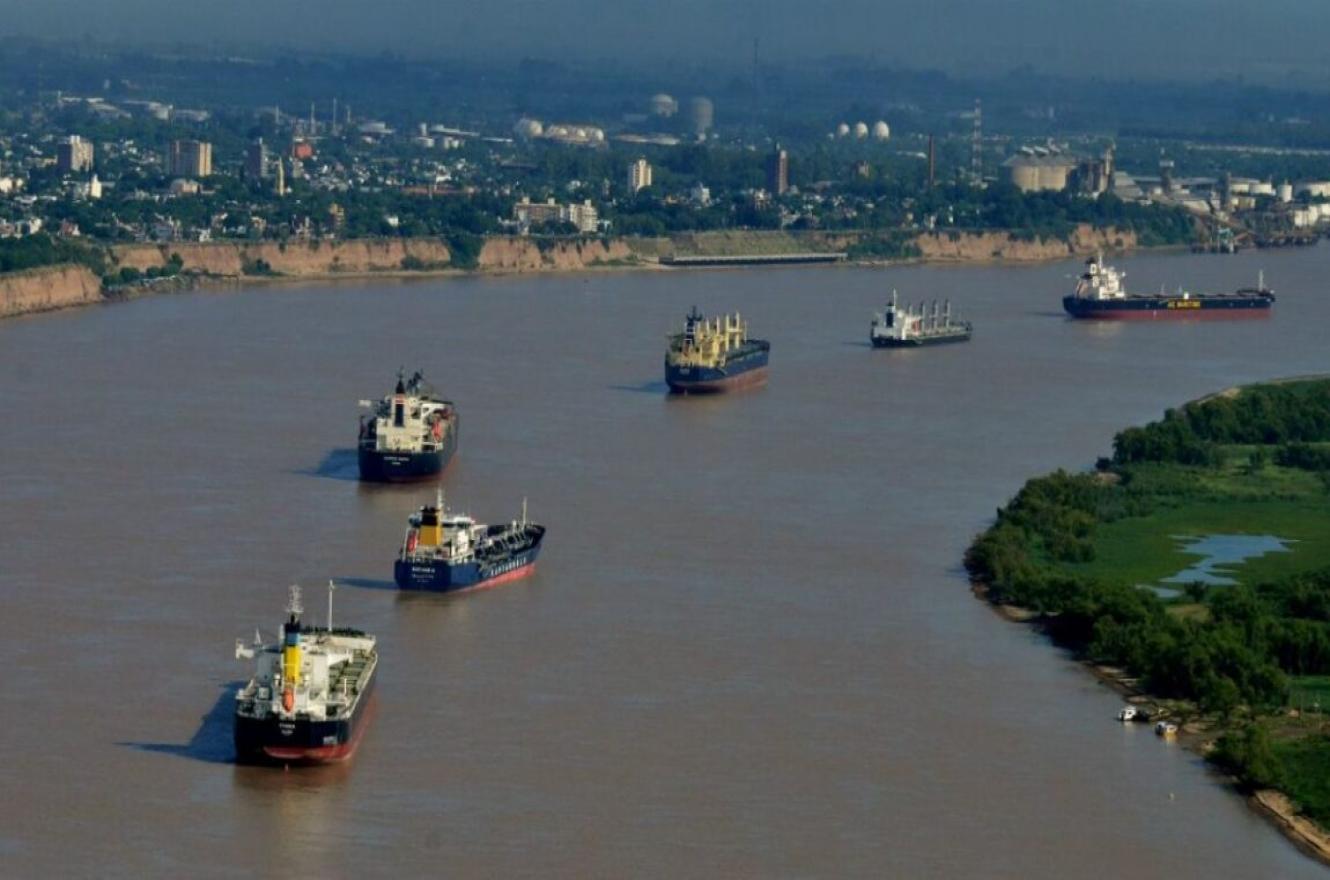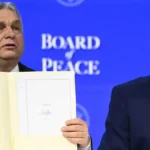
The waterway in numbers
The misnamed Paraná – Paraguay waterway (since it is a concept that makes the river as a whole invisible) is the main outlet for Argentine exports not only of commodities but also of industrial products. With a length of 3400 km it connects the world with the ports of Argentina, Brazil, Bolivia, Paraguay and Uruguay. During the year 2023, the volume operated was greater than 100 million tons of cargo represented by more than 4,000 ships operating along its entire bed.
In the case of Argentina, the Trunk Waterway connects 79 ports in the provinces of Buenos Aires, Santa Fe, Entre Ríos, Corrientes, Chaco, Formosa and Misiones. The Greater Rosario area is the section with the greatest depth, currently at 34 feet, a section through which around 80% of our exports leave.
Among the main Argentine ports and the main products operated we have:
- Puerto Campana: hydrocarbons and derivatives, fertilizers, iron ore inputs, seamless pipes, bagged and forestry products
- Puerto de Zárate: general cargo, big bags and sugar
- Port of San Nicolás: fertilizers, coal, steel products, various cargoes
- Puerto Rosario: some minerals, rails and ties, sugar and fertilizers
- Puerto San Martín: minerals and fertilizers (Profertil, TFA and other terminals) and copper from Minera Alumbrera
- Port of Timbúes: The loads that could operate the two thermoelectric plants (San Martín and Vuelta de Obligado)
The first four port terminals also operate oil and its derivatives from companies such as Petrobras, YPF, Esso, Oil Combustibles and Shell.
The waterway operates mainly as a way out to the world for the exports of the countries in the region, but it is also essential for internal trade between these countries. Thus, according to data from the Rosario Stock Exchange, The downstream movement (north – south) from Paraguay, Brazil and Bolivia was composed of products mainly from the soybean complex (66%), and to a lesser extent by products such as sugar or iron. This section that goes to the Port of Santa Fe is operated mainly by barges since due to the existing draft (approximately 10 feet) the circulation of boats is not possible.

From this point towards the sea, the draft that ranges from 28 to 36 feet makes navigation of large bulk ships possible. Argentina is the main exporter of grains and derivatives, given that Brazil does so through its own ports such as Rìo Grande or Santos, while Uruguay does so through the port of Nueva Palmira. Both Paraguay and Bolivia, which do not have their own natural ports, use the waterway as the main outlet for their exports. That is why, given the decision made by Argentina in 2022 to charge for all river transport that circulates from the Port of Santa Fe to Confluencia, it was precisely the Government of Paraguay that demanded internationally for its elimination.

Source: Renovarg
Present and future in the cocession
For 26 years it was operated by the Belgian company Jan De Nul, where the Argentine State had zero participation, which generated strong complaints about adulterations in the different billings, lack of necessary investments, drug trafficking, among others. From April 2021 to the present, the call for bids is suspended, although the current Government is carrying out negotiations to hand it over to North American firms, despite the fact that it is well known that they do not have the operational capacity that others do have. The latter is related to the low scale with which these North American companies operate given that they have almost no presence in other countries, unlike the Big Four (Jan De Nul, DEME, Boskalis and Van Oord) that control 80% of the companies. dredging operations in the world.
In September of last year, news broke of the request by the Paraguayan American Chamber of Commerce to the State Department to intervene on behalf of North American companies in Paraguay against Argentina’s imposition of a toll for the crossing. of the barges. It is argued that this type of measure goes against the signing of pre-existing pacts and treaties, seriously affecting the economic and social interests of Paraguay.
History of socio-environmental damage
Faced with such a display of colonialism, the Milei Government, far from opposing this proposal, is already taking steps to ensure that North American companies are the ones that permanently operate the Waterway. Among them, Great Lakes Dredge & Docks Company LLC, a firm that was fined one million dollars by Justice in the US for having carried out dredging work that damaged oil pipelines and generated an oil spill on the coasts of the State of Louisiana.
The damage was generated in 2016 but the sentence was only known in 2022, through which Justice maintains that the company Great Lakes Dredge & Docks carried out fraudulent maneuvers with the intention of hiding the damage generated through the construction of an illegal canal to then fill with mud to erase all evidence. As reported by the Houmatoday portal, this also generated the imposition of a payment of more than three million dollars in civil compensation to both the pipeline operating company and the community in general.
The vultures continue to stalk
Starting in 2023, the North American multinational investment company, Black Rock, acquires 10% of the shares of Great Lakes Dredge & Docks. It is well worth remembering in this caseThe interference that Black Rock has only in extractive companies in Argentina: in Vaca Muerta through Pampa Energía, Chevron and YPF SA. In mining, in the case of lithium through NewCo and in gold, copper and silver, being the owner of Glencore PLC. In the case of exports of grains and their derivatives, with the participation in Viterra Argentina SA, Black Rock imposes conditions on the entire agri-food sector in the country.
Milei is seeking to attract foreign capital by raffling off natural common goods, as expressed in the proposal of the RIGI contained in the Bases Law. To encourage investments (which are not guaranteed to arrive) this regime provides for the granting of tax benefits for decades, unrestricted access to the official exchange market (dollars), the looting of resources without control and the elimination of any regulations on socio-environmental matters. It is the necessary legal framework for extractivism to continue advancing in the country hand in hand with vulture funds like Black Rock., since having the operation of the Waterway in their hands is not only an extremely profitable business but also guarantees these companies effective control of one of the most important foreign trade routes in Latin America; On the other hand, for Argentina, this translates into loss of political and economic sovereignty, impossibility of effective control of its foreign trade, more external restrictions than those that already exist and total dependence on the interests of one of the largest economic groups in the world. planet.
Deepen the delivery of foreign trade management in the hands of large economic groups It is a decision that goes against the interest of working people, even more so in a context marked by global economic ups and downs and the scarcity of foreign currency that escapes in this way. The lack of dollars begins to accentuate the contradictions of the national economy, hand in hand with delayed disbursements by the IMF, and a growing political crisis. It is time to question the outlets for dollars by these concentrated groups.
He Paraná River is a natural common good, whose exploitation should be managed democratically by all workers, prioritizing all those who live and enjoy the resources that the river provides. This is why any bidding agreements for dredging and marking of the waterway should meet the criteria of socio-environmental preservation, following economic planning that takes into account the interest of the majority and guaranteeing the maintenance of foreign trade based on political sovereignty. and economical.
The state monopoly of foreign trade managed by workers would allow us to define what the priorities of commercial exchange are, or what imports can and should be replaced by local production. In this way, resources could be secured to increase productive capacity and develop fundamental infrastructure, the construction of homes, schools, hospitals, the modernization of transportation, among other measures.
Source: www.laizquierdadiario.com

